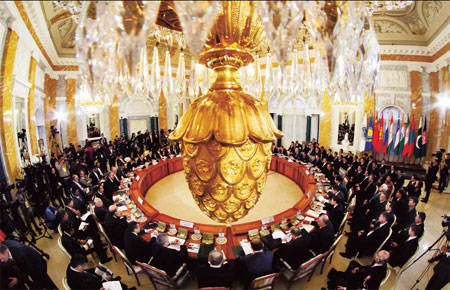Neighbors prepare for Afghan reconstruction
Updated: 2011-11-08 08:00
By Guo Ji (China Daily)
|
|||||||||

|
Delegates to the Shanghai Cooperation Organization attend the group's 10th prime ministers' meeting in St. Petersburg, Russia, on Monday. The group is working for closer political and economic cooperation. Dmitry Lovetsky / Associated Press |
BEIJING - The Shanghai Cooperation Organization's role in Afghanistan will only become more important as time goes on, especially after most of NATO's combat forces exit the country, analysts say.
The organization, which advocates fighting against the "Three Evil Forces"- terrorism, religious extremism and regional separatism - held its 10th annual prime ministers' meeting on Monday.
"It is evidently in the US' strategy in the run up to its exit from Afghanistan to encourage more regional players to be involved in Afghanistan, thus giving the Shanghai Cooperation Organization, which is closer geographically, a greater say in matters," said Zhao Huasheng, director of the Shanghai-based Fudan University's center for Russia and Central Asia studies.
Washington seems to be welcoming more regional powers to take up various responsibilities in Afghanistan. One fruit of those efforts is a proposal to build a "New Silk Road", which is to take existing roads, railways and power lines in Central Asia and bring them south through Afghanistan, Pakistan and India. The transportation network is to be the economic foundation of the US' post-2014 plans for Afghanistan.
"Countries like Tajikistan, Uzbekistan, Iran, Pakistan and India - these regional players could motivate certain groups inside Afghanistan to join internal conflict resolution talks," Dr Nivedita Das Kundu, a foreign-policy analyst with the Indian Council of Social Science Research, wrote in a Russian newspaper.
Statistics show that nearly 30 percent of Afghan residents belong to the Tajik ethnic group and nearly 10 percent to the Uzbek ethnic group. The largest number of people in the country are of the Pashtun group but Pakistan has a larger number of Pashtun-speaking people.
"The greatest advantage for the Shanghai Cooperation Organization in Afghan matters is the fact that it includes most of Afghanistan's neighbors," Zhao said, noting that five of the landlocked country's six neighbors - China, Tajikistan, Uzbekistan, Pakistan and Iran - are either members of the organization or observer states in it.
Speaking at an international conference in Istanbul, Turkey, this past week, Assistant Foreign Minister Liu Zhenmin called on the international community to continue extending assistance to Afghanistan and reiterated China's steadfast support for the reconstruction of that country.
Liu also encouraged the international community to respect Afghanistan's sovereignty.
Hu Shisheng, an expert in South Asia studies with the China Institutes of Contemporary International Relations, said: "China's role in Afghanistan used to be concentrated in the economic field, but recent statements seem to suggest it is taking on a more vigorous political role."
Although it is unlikely US forces will withdraw completely from Afghanistan after 2014, Hu said China must also play a role from now on in shaping Afghanistan's future.
"Of course China can't act alone, but only with other regional players," Hu said.
Analysts said the Shanghai Cooperation Organization members and observer states have a large interest in ensuring that Afghanistan is stable.
"Afghanistan is the nerve center of this region," Zhao said. "Any of the country's actions raise concerns in neighboring countries. Unless a settlement in Afghanistan is secured, the region can hardly secure peace."
The subject of Afghanistan has long appeared on the Shanghai Cooperation Organization's agendas. In 2004, Afghan President Hamid Karzai was invited to attend the organization's leaders' summit in Toshkent, the capital of Uzbekistan. Afterward, a liaison group between the organization and Afghanistan was established, and Karzai has attended the organization's summit meetings since 2006.
It will be extremely difficult to win the fight against drugs and terrorism unless Afghanistan is made stable, Hu said.
Other analysts said the Shanghai Cooperation Organization's role in promoting peace and reconciliation in Afghanistan has not been clear until now.
Several academics called on the organization to form a clear plan to guide its actions in Afghanistan and said the group's great potential should be turned into actual deeds.
"The organization should come up with its own outline for Afghanistan," Zhao said. "That should take into account a grand vision, concrete plans and the basic principles of the organization."
China Daily
(China Daily 11/08/2011 page3)












